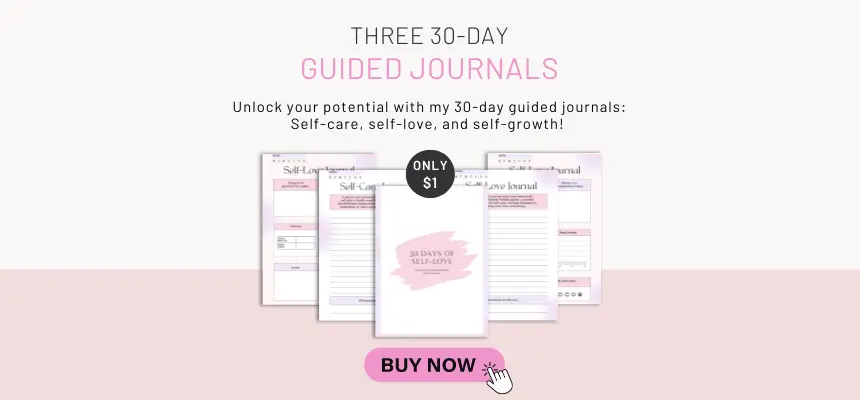105 productivity journal prompts for a productive day ahead
Are you ready to use these journal prompts for productivity to unleash your full potential and conquer each day with newfound motivation?
Today, we’re diving into the transformative power of journaling.
Beyond simply writing down thoughts, journaling can supercharge your productivity, help you focus on your goals, and track your progress.
Get ready to embark on a journey of self-discovery and increased productivity as we explore unique productivity journaling prompts curated just for you.


This post may contain affiliate links. That is, if you click on a link and buy something I recommend, I will receive a small compensation at no additional cost to you.
105 productivity journal ideas
25 journal prompts for focus
- What things distract you the most in your life right now? How can you reduce or remove them to stay focused?
- Write about a time when you were completely focused and “in the zone.” What helped you achieve that level of concentration?
- What are three tasks or projects that need your immediate attention? How can you prioritize them effectively?
- Do your daily habits affect your ability to stay focused? Are there any habits you need to change or develop?
- Think about a recent situation where you struggled to stay focused. What made it difficult for you to concentrate?
- What strategies have worked well for you in the past to improve your focus? How can you include them in your current routine?
- Write down three specific goals you want to achieve in the next month. How can you break them into smaller steps to stay focused?
- Describe the ideal work environment that helps you concentrate. What can you do to create or improve that environment?
- What happens if you don’t stay focused on your priorities? How can you stay motivated and overcome distractions?
- Identify three activities or habits that make it hard to focus and drain your energy. How can you limit or remove them from your daily routine?
- Think about an accomplishment that required intense focus. How did you manage to stay concentrated?
- How does technology affect your focus? How can you use technology more mindfully to stay productive?
- How can you manage your time better to have dedicated blocks for focused work without interruptions?
- Describe a task or project that you’ve been avoiding. What steps can you take to break it down and tackle it with focused effort?
- Think about a time when you easily got distracted. How did you feel? What thoughts were on your mind? How can you address those things to improve your focus?
You might also like: Practical journal prompts to help you deal with daily stress
- List three strategies to help you concentrate and avoid feeling tired when you work or study for long periods of time.
- Think about how your physical well-being affects your ability to stay focused. How can you take care of your body to improve your focus?
- Choose three areas of your life where you want to improve your focus, like relationships, personal growth, or your career. What can you do to give more attention and energy to those areas?
- Think about a recent success that happened because you stayed really focused. How did it feel, and how can you recreate that feeling in the future?
- Think about three things that often distract you during your workday. How can you deal with them ahead of time to stay focused?
- Describe an activity that helps you be more mindful and focused, like meditation, deep breathing, or yoga. How can you include it in your daily routine?
- How can you get into the habit of focusing on one thing at a time instead of trying to do many things at once? This can help improve your focus and productivity.
- Find a belief or self-doubt that makes it hard for you to concentrate. How can you change it into a positive thought that supports your focus?
- Think about the times of day when you naturally feel more focused and awake. How can you plan your schedule so that important tasks happen during those times?
- What is one small change you can make today to help you stay focused better?
25 journal prompts for organization
- Think about the parts of your life or work that could use some organizing. What specific tasks, projects, or spaces need improvement?
- Imagine your perfect, organized workspace. What would it look like? Think about what elements it should have and how you can create that environment.
- Think about a recent situation where being disorganized caused problems or made things harder. What happened as a result, and what can you learn from it?
- Write down three ways you’ve successfully organized things in the past. How can you use those strategies to reach your current organizational goals?
- How can you get better at managing your time? Think about how organizing your schedule can help you be more productive.
- Find three areas of your life where you tend to be disorganized. What can you do to create systems and routines that bring order to those areas?
- Think about a recent time when you were organized and things went well. What did you do to make that happen, and how can you do it again in other areas?
- Describe how you currently manage your tasks and to-do lists. Is it working, or can it be improved? If it needs improvement, how can you make it better?
- How can you use technology or digital tools to make your organizational processes smoother and reduce clutter?
- Find three physical spaces that need better organization, like your workspace or a specific room. What steps can you take to declutter and make them more organized?
- Think about a time when disorganization made you feel overwhelmed. How did it make you feel, and how can you use that as motivation to stay organized?
- Write down three areas of your life where you want to be more organized. How can you break those areas down into smaller steps you can take?
- How can you create a more efficient way to handle your daily tasks and responsibilities? Look for any problems or things that slow you down and come up with solutions.
- Describe how you currently handle paper and documents. Is it working well, or do you need a better system?
- How can you make your digital files and folders easier to use and find information in?
You might also like: I highly suggest you try these amazing gratitude writing prompts this week
- Think about three things you often do that waste time or make it hard to stay organized. How can you stop or reduce these activities to get more done?
- Take a moment to appreciate the benefits of staying organized. How does it make you feel better and help you work more efficiently?
- Write down three tools or things that can help you get organized, like apps, planners, or labels. How can you use them in your daily routine to stay on track?
- How can you create a regular schedule for checking and organizing your email? Maybe you can try strategies like keeping your inbox empty or setting specific times to manage your emails.
- Describe a way to manage and prioritize your tasks effectively. How can you make sure important tasks get the attention they need and are finished on time?
- Think about how you can give some tasks to others to lighten your load and stay organized. How can you delegate responsibilities to make things easier for everyone?
- Consider the challenges that might come up as you work on getting more organized. Make a plan for how to handle these obstacles and stay on track.
- Describe a method for tracking your progress towards your organizational goals. How can you celebrate when you reach important milestones and stay motivated along the way?
- Think about how you can keep your physical and digital spaces neat and tidy to avoid clutter and stay organized.
- What is one small change you can make today to become more organized? It could be something simple and manageable that helps you stay on top of things.
You might also like: The best journal prompts to help you deal with your anger
25 journal prompts for work
- What parts of your job do you enjoy the most? How can you include more of these aspects in your daily routine?
- Describe a recent achievement at work that made you proud. What skills or qualities did you demonstrate in accomplishing that success?
- Think about a time when you faced a big challenge at work. How did you overcome it, and what did you learn from the experience?
- List three professional goals you want to achieve in the next six months. What specific steps can you take to work towards those goals?
- What are your strengths and skills that benefit your work? How can you use them to excel in your current role?
- Identify a skill or area of knowledge you want to develop more in your work. How can you find opportunities to grow and expand in that area?
- Reflect on a recent collaboration or teamwork experience at work. What did you learn about effective communication, cooperation, and achieving common goals?
- Describe your ideal work environment and culture. What elements would it have, and how can you contribute to creating that atmosphere?
- How can you improve your time management to be more productive and have a balanced work-life?
- Identify three areas of your work that could be more efficient or streamlined. What steps can you take to simplify processes and eliminate unnecessary tasks?
- Think about a recent situation where you received constructive feedback or criticism at work. How did you handle it, and what did you learn from it?
- List three professional development opportunities or resources (like workshops, webinars, or books) that can enhance your skills and knowledge in your field. How can you incorporate them into your ongoing learning?
- How can you build stronger relationships and connections with your colleagues and teammates? Find ways to foster trust, collaboration, and a supportive work environment.
- Reflect on a time when you had to navigate a difficult work relationship or conflict. What strategies did you use to find common ground or resolution?
- Describe a mentor or role model in your professional life. What qualities do they have that you admire, and how can you apply those qualities to your own work?
You might also like: Positive journal prompts for improving your body image
- How can you effectively manage and prioritize your workload to make sure you focus on the most important tasks and projects?
- Identify three areas where you want to improve your professional communication skills (like speaking, writing, and listening). What can you do to develop those skills?
- Think about a time when you took a risk at work. What happened, and what did you learn from trying something new?
- Describe your long-term career goals and how your current work fits into those goals. What can you do to move forward in your career?
- How can you find purpose and meaning in your work? Connect your daily tasks to the bigger picture and see how they make an impact.
- Think about a time when you had to adapt to a change at work. How did you handle it, and what skills did you use to succeed?
- List three areas where you want to improve your problem-solving skills at work. How can you be more proactive and come up with creative solutions?
- Describe a time when you were recognized for your work. How did it make you feel, and how can you keep striving for excellence?
- How can you take care of yourself while working? Find ways to include self-care in your routine to avoid burnout.
- What’s one small thing you can do today to improve your work-life balance and create a healthier integration of work and personal life?
30 morning journal prompts for productivity
- What am I thankful for today, and how can I keep that gratitude with me throughout the day?
- What specific goals or tasks do I want to accomplish today? How can I break them down into smaller steps?
- Think about the top three things that need your attention today. How can you make sure you focus on them?
- How can I start the day with a positive mindset? What attitude or mindset can help me be more productive?
- Describe a morning routine that energizes and prepares you for the day. How can I make it even better?
- What are three things that might distract or challenge you today? How can you handle them before they become a problem?
- Write a quote or something positive that motivates me. How can I keep that in mind throughout the day?
- How can you include self-care and relaxation in your morning routine to be more productive and feel better?
- Think about something you accomplished recently that you’re proud of. How can you carry that feeling into today’s tasks?
- Choose one area where you want to improve your time management. What can you do today to work on that?
- Write down three things you can ask for help with or delegate today. How can that free up your time?
- How can you plan out your day and stay organized? Consider using a list, planner, or app to keep track of your tasks.
- Describe the best work environment for today. How can you set up your space to help you focus and avoid distractions?
- Think about something new you’ve learned or a skill you’ve developed. How can you use that knowledge in your work today?
- List three people or resources you can turn to for help or advice in your work today. How can they make you more productive?
You might also like: The best money mindset journal prompts to improve your finances
- How can I take moments to be calm and think clearly during the day? What can I do to be more mindful?
- Describe something that has helped you stop procrastinating in the past. How can you use it today?
- What’s one thing I want to change to be more productive? How can I start making that change today?
- Think about things that might distract you or waste your time today. How can you stay focused and avoid them?
- Write a letter to your future self about what you want to achieve today.
- How can I keep a good pace and take short breaks or rewards to stay motivated?
- What’s one thing I want to learn or get better at? How can I make time for it today?
- Think about how your work helps others or the world. How can you connect with that today?
- What can I do to stay focused and engaged during meetings or when working with others today?
- Describe a good habit or routine you want to start in your work. How can you start it today?
- Think about balancing work and your personal life. How can you take care of yourself today?
- Write down three positive things about yourself to remember today.
- How can I celebrate small wins and stay motivated today?
- Describe a plan to deal with interruptions and protect your time today.
- What’s one thing I can do today to help a colleague or teammate succeed?

FAQ: What is productivity, and how can we improve it?
What is productivity, you ask? At its core, productivity is all about optimizing your time and resources to achieve your goals effectively. It’s about finding that magical balance where you can work smarter, not harder.
Productivity is not just about being busy; it’s about being purposeful and deliberate in your actions. It’s about focusing on what truly matters and eliminating distractions that hinder your progress.
Prioritize your tasks
Start by identifying the most important and urgent tasks on your to-do list. Focus your energy on completing these tasks first, as they have the greatest impact on your goals and outcomes.
Consider using techniques like the Eisenhower matrix to categorize tasks based on their importance and urgency.
Break it down
Overwhelm can be a major productivity killer. Break down large projects or tasks into smaller, more manageable chunks.
This helps you stay motivated, maintain clarity, and make steady progress toward your goals. Celebrate each milestone achieved along the way!
Time blocking
Allocate specific blocks of time for different tasks or activities. By scheduling dedicated time slots for focused work, meetings, breaks, and personal activities, you create a structured routine that optimizes your productivity.
Experiment with different time blocks to find what works best for you.
Minimize distractions
Identify, eliminate, or reduce distractions that derail your focus. Silence notifications on your phone, close unnecessary tabs on your computer, and create a quiet workspace.
Consider using productivity tools or browser extensions that block social media or limit time spent on certain websites.
Practice mindfulness
Cultivate mindfulness to improve your concentration and mental clarity. Take short breaks throughout the day to engage in deep breathing, meditation, or stretching exercises.
Mindfulness helps reduce stress, boost your energy levels, and improve your overall productivity.
Use the power of journaling
Journaling is a fantastic tool to enhance productivity. Take a few minutes each day to reflect on your goals, track your progress, and identify areas for improvement.
Consider using specific journal prompts for productivity to spark insights and inspire action.
Delegate and outsource
Learn to delegate tasks that can be done by others. This frees up your time for higher-priority responsibilities.
Consider outsourcing tasks that fall outside your expertise or consume too much time. This allows you to focus on what you do best and maximize productivity in those areas.

FAQ: Why should you journal for productivity?
Why should you journal for productivity? Well, let me tell you, journaling is a game-changer when it comes to boosting your productivity levels. It goes beyond just writing down your thoughts.
It’s a powerful tool that can supercharge your focus, enhance your self-awareness, and help you stay on track toward your goals.
Here are a few compelling reasons why journaling should be an essential part of your productivity toolkit:
Clarity and goal-setting
By putting your ideas and aspirations on paper, you gain a clearer perspective on what you want to achieve and can break it down into manageable tasks.
This clarity empowers you to prioritize effectively and work towards your goals with purpose.
Tracking progress
Journaling allows you to track your progress over time. You can record your accomplishments, note areas for improvement, and reflect on lessons learned.
This retrospective view allows you to identify patterns, recognize your strengths, and make adjustments to optimize your productivity.
It serves as a tangible reminder of how far you’ve come and motivates you to keep going.
Problem-solving and brainstorming
When faced with challenges or obstacles, journaling can be a powerful problem-solving tool. By writing down the issue at hand, you engage both the logical and creative aspects of your mind.
Writing prompts for productivity can spark innovative solutions and fresh perspectives, helping you overcome roadblocks and find effective ways to move forward.
Reflection and self-awareness
Through regular journaling, you can identify what strategies work best for you, recognize triggers that derail your focus, and develop strategies to overcome them.
This self-awareness allows you to make intentional choices that align with your productivity goals.
Stress reduction and mental well-being
Journaling provides a therapeutic outlet to unload emotions and declutter your mind. By venting frustrations or worries on paper, you create mental space for clarity and calmness.
This promotes a positive mindset and allows you to approach tasks with renewed energy and focus.
FAQ: How do I get started with journaling for productivity?
Getting started with journaling for productivity is an exciting journey that begins with a few simple steps. Let’s explore how you can embark on this transformative practice:
Choose the right journal
Find a journal that speaks to you. Whether it’s a sleek leather-bound notebook or a vibrant, artsy journal, pick one that sparks joy and invites you to write.
The physical act of opening a beautiful productivity journal can create a sense of anticipation and motivation.
Set aside dedicated time
Choose a specific time in your day to journal. It could be in the morning to set intentions for the day ahead or in the evening to reflect on your accomplishments and lessons learned.
Consistency is key, so find a time that works best for you and make it a non-negotiable part of your routine.
Create a welcoming environment
Find a quiet, comfortable space where you can focus without distractions. Light a candle, play soft music, or incorporate any elements that make the space inviting and conducive to reflection.
Make it your personal oasis where you can connect with your thoughts and ideas.
Start with journal prompt ideas
If you’re unsure where to begin, my journal prompts for productivity can be a great starting point. They provide specific questions or statements that trigger your thoughts and guide your writing.
Embrace freewriting
Allow your thoughts to flow freely onto the page. Don’t worry about grammar, spelling, or structure. Just let your pen glide across the paper as you express your thoughts, feelings, and aspirations.
Freewriting encourages a stream-of-consciousness style that can lead to surprising insights and breakthroughs.
Experiment with different styles
Explore different journaling styles to find what resonates with you. Some people enjoy bullet journaling, where they use symbols, charts, and lists to track tasks and goals.
Others prefer narrative journaling, where they write more extensively about their experiences and reflections. Find your unique style and adapt it as you go.
Stay consistent
Make journaling a habit by committing to it consistently. Even if you can only spare a few minutes each day, prioritize that time for yourself and your personal growth.
Remember, every entry counts, and over time, you’ll see the cumulative impact of your journaling practice on your productivity.
Will you use any of these journal prompts for productivity?

I consider myself an expert when it comes to positive affirmations, journaling, and inspirational quotes. My blog is all about spreading good vibes and helping you feel awesome! I’ve got loads of cool stuff for you to explore, like uplifting affirmations that can boost your confidence, fun journal prompts to spark your creativity, and inspiring quotes to motivate you every day. Let’s embark on this amazing journey together as we discover more about ourselves, uncover our hidden strengths, and create a life that’s full of happiness and success.







